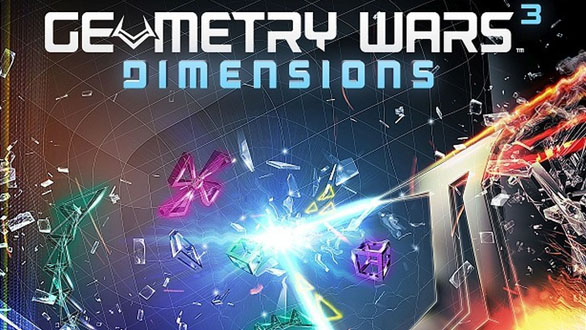
Some track the player slowly but relentlessly, some are fast, some try to avoid his fire, and so on. In all three games, the player is placed in a single static screen and then assailed by hordes of enemies from a small cast list, each exhibiting very distinct behavioural characteristics. The original Geometry Wars and its largely-the-same 360 follow-up are both obvious and unashamed descendants of Eugene Jarvis' legendary coin-op Robotron. If you remember Starstrike 2 on the Speccy, you'll feel at home in this shot. And if we're going to try to understand how such a feat can be achieved, we're going to have to examine both why Geometry Wars is good, and why Grid Wars 2 is so much better. But GW2 creator Mark Incitti has taken a game that was already very delicately balanced, added and changed elements that fundamentally alter the nature of the gameplay, and still come up with something that recognisably possesses the character of its parent yet is a vastly - almost immeasurably - different, and superior, game. If you can create a game that anyone can pick up, understand and start playing in seconds without having to even glance at an instruction manual, yet which players will still be organically learning the subtleties of, and developing new tactics and strategies for, hours and days and weeks later, then you're a great designer.Īny idiot can do one of the two, and even experienced authors who seem to understand the skill of combining both can get it spectacularly right, and then catastrophically wrong, in two almost identical circumstances. The defining characteristic of all good game design - not just videogames - is the marriage between accessibility and depth. Remarkable, in fact, to the extent that it's possibly the single most perfect piece of pure videogame design that this reporter has seen in the last decade. (Or to be strictly accurate, not unlike its sequel, Geometry Wars: Retro Evolved, which runs on the Xbox 360 and is the flagship title of the machine's online service, Xbox Live Arcade.) In itself that'd be passingly interesting - particularly for anyone who didn't want to fork out £300 for a state-of-the-art, all-singing, all-dancing Xbox 360 in order to play a vector-graphics Robotron game - but while GW2 is undeniably closely related to GW:RE, it's the ways in which it's different that make it remarkable.

/cdn.vox-cdn.com/uploads/chorus_image/image/44233658/GeoWars3_Screens_Turbine_Cube_01.0.0.jpg)
It is, as the alert viewers of WoS will instantly recognise, not unlike Geometry Wars, the secret bonus game concealed within Project Gotham Racing 2 for the Xbox.
GEOMETRY WARS 3 DIMENSIONS SOUNDTRACK DOWNLOAD PC
Grid Wars 2, by Mark Incitti, is a freeware game for PC and Mac. I died 0.2 seconds after taking this screenshot. There's nothing actually wrong with any of those things (well, for the purposes of this particular argument there isn't, anyway), but they're not videogames.
GEOMETRY WARS 3 DIMENSIONS SOUNDTRACK DOWNLOAD TV
Now, "videogame" encompasses everything from gruelling work simulators like Gran Turismo 4 or America's Army to the town-hall nerd-conventions of online role-playing fantasy communities like World Of Warcraft, or the semi-interactive fiction of point-and-click adventures and single-player RPGs, or even TV quiz shows like Buzz. The very word "videogame" inherently depicted something exciting, glamorous and - because most games were located in arcades, places where under-18s weren't allowed - slightly forbidden and dangerous too.įor want of anyone bothering to come up with a better replacement in the last 30 years, "videogames" is still the umbrella term we use for all forms of interactive electronic entertainment displayed on a screen, and as a result the clarity and purity of its meaning has been debased and corrupted.


The term was coined back in the 1970s to describe something that at the time was a completely new and revolutionary artform (it must be barely conceivable to today's gamers that there was a time in living memory when such things as games played on a TV screen simply didn't exist), and the image it conjured up was a straightforward one of Asteroids, Pac-Man and Space Invaders - that is, an abstract, magical and ultra-modern type of entertainment, born in technology and totally unrelated to any kind of leisure pursuit that had ever gone before it.


 0 kommentar(er)
0 kommentar(er)
